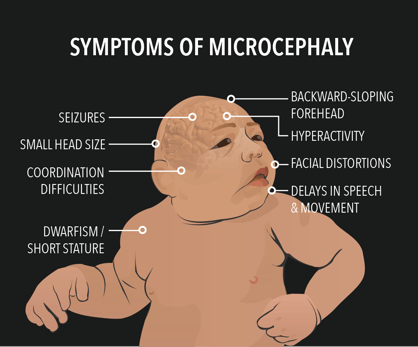
Microcephaly has been linked to the Zika virus
(Photo courtesy of of wikimedia commons)
With Zika outbreaks in Mexico, Central America, and South America, the National Institute of Child Health and Human Development (NICHD) is attempting to stop the virus at our border. To assist with this effort, the institute is funding a study led by Dr. William Britt, Professor of Pediatric Infectious Diseases at the University of Alabama at Birmingham (UAB). This study will take place in Brazil, where the World Health Organization (WHO) estimates that between 500,000 and 1.5 million people have been infected by Zika. The study will follow pregnant women in Brazil regardless of their Zika virus infection status and follow the infants suspected of having Zika from birth until 2 years of age.
The goal is to enroll 200 women per month and gather samples of blood, urine, breast milk, and amniotic fluids from the mothers as well as urine, saliva, and cord blood from the newborn infants. Dr. Suresh Boppana and Dr. Karen Fowler, professors in the UAB Department of Pediatrics, are co-investigators in this effort to improve our understanding of the Zika virus's effects on reproductive health and the developing fetus.
What is Zika?
Zika is a virus that is spread by certain species of mosquitoes. One of these species also carries dengue and yellow fever. Usually those with the virus show no symptoms, though they sometimes are afflicted with a fever and rash. The main danger stems from the fact that the virus can be passed from a pregnant woman to her fetus. This can lead to a serious birth defect known as microcephaly, which means “small head”. It can also cause other defects in the eyes and brain and cause hearing and impaired growth.
Is it in the United States?
As of January, there had only been 31 cases of Zika in the US, and all of them occurred after traveling to affected areas. However, with the virus right across our border in Mexico, it may only be a matter of time. After all, since the first reported case of Zika in South America a year ago, the virus has spread to more than 20 countries in the Americas. The Journal of American Medical Associations recently stated that Zika had “an explosive pandemic potential” and WHO formed an emergency committee. The general director, Doctor Margaret Chan stated, “The level of concern is high, as is the level of uncertainty.”
What about a vaccine?
Officials from the National Institute of Health (NIH) say that there are two potential Zika vaccines in development; however, they will not be widely available for several years.
Aren’t the Olympics being held in South America?
Yes, Rio is one of the areas affected by Zika, and while the Brazilian government assures the public that everything possible is being done to minimize the danger, the International Olympic Committee is advising pregnant spectators and participants not to attend. It is important to note also that the disease can be sexually transmitted, so a man traveling to an affected area could infect his partner and, in turn, his unborn baby.
Studies such as the one to better understand Zika is just one of many research projects at the University of Alabama at Birmingham's School of Medicine, where basic science research is considered critical to their mission to improve health.
The School of Medicine has more than 950 residents and 1,400 full-time faculty members in 26 academic departments. UAB is the home of The Kirklin Clinic and University Hospital, one of the largest academic hospitals in the country.
On Wednesday, November 9th 216 Biotechnology Calendar Inc. will host the 17th Annual Bioresearch Product Faire™ at the University of Alabama. This gives researchers the opportunity to meet face to face with laboratory suppliers and learn about the latest innovations in research equipment.

Laboratory suppliers wishing to demonstrate their products to the science professionals on campus at this event should call (530) 272-6675, or visit the link below.




